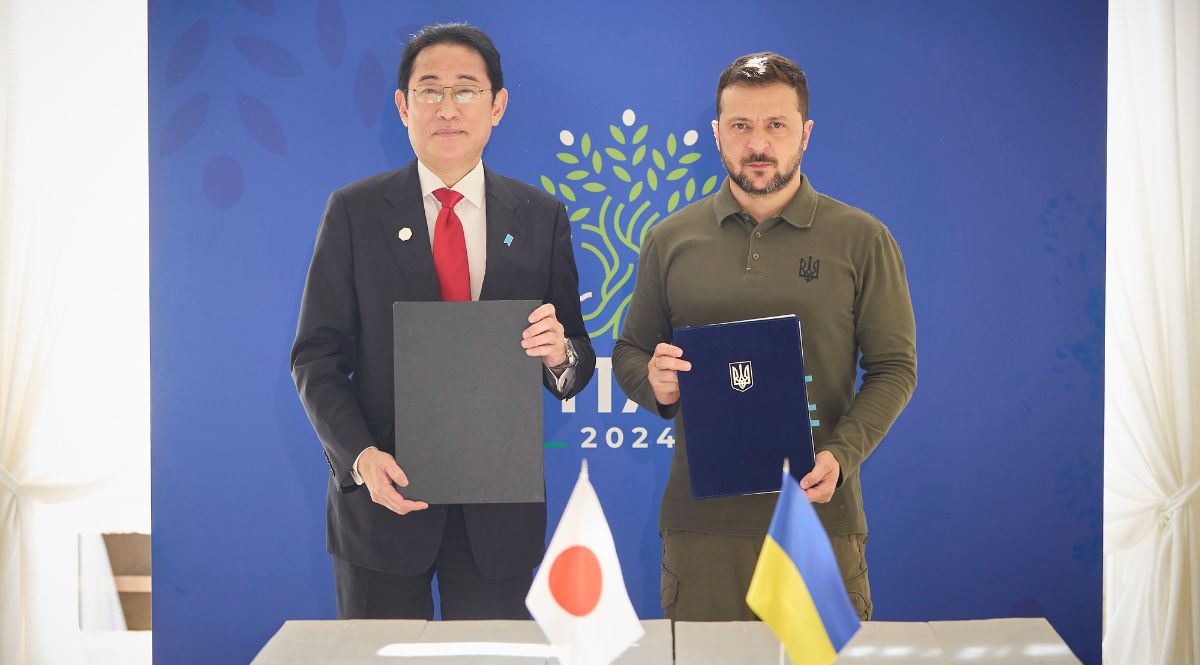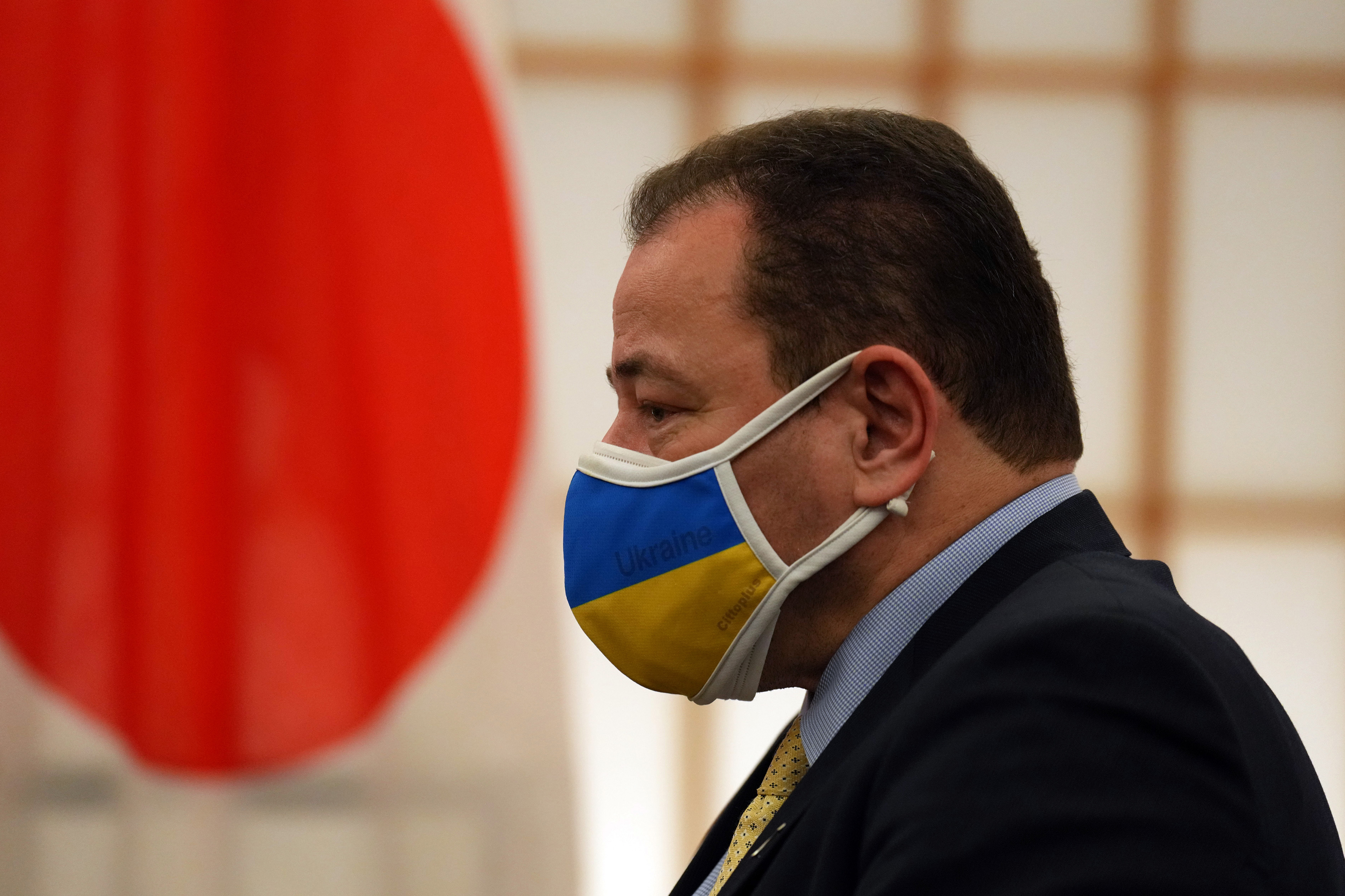Japan Increases Its Support for Ukraine
Japan is the first non-NATO country to sign a bilateral security agreement with Ukraine. The agreement, modelled on those of other G7 members, focuses on non-lethal arms supplies, humanitarian and economic assistance, and enhanced political dialogue on security issues. The convergence of views on Russia’s policy and the potential to support Ukraine creates an opportunity for Poland and NATO to deepen their cooperation with Japan.
 Pool /Ukrainian Presidentia / Zuma Press / Forum
Pool /Ukrainian Presidentia / Zuma Press / Forum
Since the beginning of the Russian invasion of Ukraine in February 2022, Japan has been providing extensive support to Ukraine and putting pressure on the aggressor. To date, Japan has pledged and provided $12 billion in financial, humanitarian, and other assistance, of which $4.5 billion is expected by the end of this year. It also backs Ukraine’s sovereignty and territorial integrity within the internationally recognised borders since 1991, imposes sanctions on Russia, advocates for the Ukrainian peace formula, and works to hold the aggressor accountable for war crimes and damages.
Japan’s support for Ukraine is grounded in its foreign policy principles, which are centred on the protection of the rules-based international order, envisioned within the context of a free and open Indo-Pacific, as well as Japan’s status as a member of democratic countries. It also reflects the Japanese authorities’ conviction that Euro-Atlantic and Indo-Pacific security is interlinked. From the Japanese perspective, supporting Ukraine and pressuring Russia are designed to deter China from aggressive actions in the Pacific (for example, in the Taiwan Strait or the South and East China seas) and to increase the likelihood of Japan’s support from its partners, including European ones, should disputes with China escalate. Japan, like NATO and Poland, views Russia’s invasion of Ukraine as a serious threat to international security. It is also keen for the U.S. to continue to support Ukraine, as Prime Minister Kishida Fumio called for in Congress in April this year.
Since March 2023, Japan and Ukraine have been linked by a special global partnership, established during a meeting between Kishida and President Volodymyr Zelensky in Kyiv. On 13 June of this year, on the sidelines of the G7 summit in Apulia, the two leaders signed a bilateral security agreement, formally known as the Accord on Support for Ukraine and Cooperation between the Government of Japan and Ukraine. The 10-year accord is another agreement signed on the basis of the G7 joint declaration of July 2023.
Security and Defence
In the agreement, Japan pledges to continue to provide security and defence assistance to Ukraine, albeit within the constraints of its constitutional and legal limitations. These constraints restrict Japanese assistance to the transfer of non-lethal military equipment, including trucks, reconnaissance drones and their detection systems, body armour, helmets, and mine-clearance equipment. In addition to further equipment supplies, Japan will continue to cooperate with the Defence Contact Group of Ukraine, including through participation in coalitions of countries supplying IT and demining equipment. In the latter area, Japan will strengthen its cooperation with Cambodia in training Ukrainian sappers, which began in 2022. It also pledges further contributions to NATO’s Comprehensive Assistance Package for Ukraine and to the treatment of wounded Ukrainian soldiers. Japan and Ukraine also intend to deepen intelligence cooperation and establish a high-level security dialogue.
The parties have also established a mechanism for holding consultations within 24 hours in the event of a future Russian military attack on Ukraine (after the current conflict is settled). They also intend to develop cooperation in the field of cybersecurity, including the exchange of experience and information on countering Russian cyberattacks. Japan and Ukraine also seek to counter hybrid threats from Russia, other states, and non-state actors. Cooperation will include combating foreign manipulation of information and interference, as well as organised crime. Japan also aims to assist Ukraine in strengthening its resilience and enhancing its capacity to protect the population against chemical, biological, and nuclear threats.
Despite restrictions on military aid, Japan may be indirectly supporting arms supplies to Ukraine. This is due to last December’s amendments to arms export regulations, which are part of Japan’s evolving security policy, hastened by the Russian onslaught. These changes allow, among other things, the export of military equipment manufactured in Japan under foreign licences to the countries from which the licences originate and subsequent sale to third countries (provided they are not at war). This amendment allowed the export of missiles for the Patriot system from Japan to the U.S. to replenish its stocks, which had been depleted following the transfer of these systems to Ukraine.
Humanitarian and Economic Support
Since the beginning of the war, Japan’s assistance to Ukraine has focused on humanitarian and economic support. This is provided through bilateral channels, including Japan’s official development assistance, and multilateral channels such as the Donor Coordination Platform for Ukraine. In February this year, 56 agreements were signed at the Japan-Ukraine conference in Tokyo, announcing the involvement of Japanese public institutions and the private sector in Ukraine’s post-war reconstruction.
Under the security agreement, Japan’s assistance will include improving the humanitarian situation and living conditions, developing the agricultural, digital, and innovative manufacturing sectors (including biotechnology), and rebuilding critical infrastructure such as transport and energy. Japan and Ukraine have pledged to seek to rebuild and develop Ukraine’s industrial base through the establishment of joint ventures and joint research projects. The Japanese authorities will also encourage private companies to support selected Ukrainian industries, including machinery, electronics, and food processing.
The agreement also provides for further humanitarian assistance from Japan to Ukraine. This is to include support for the healthcare system (the reconstruction of damaged infrastructure, the supply of medicines and medical equipment), assistance to women and children (in line with the UN Women, Peace and Security agenda), and winter support (power generators, clothing). While supporting Ukraine’s aspirations for European Union membership, Japan has also expressed its intention to provide assistance with the country’s reform process, including the combating of corruption, the enhancement of the quality of governance, and the reinforcement of democratic institutions’ resilience.
Conclusions and Perspectives
The Japan-Ukraine agreement is very similar in many respects to agreements that Ukraine has concluded with the U.S., the United Kingdom, Germany, France, Poland, and others. This is particularly evident in the political support and consultation mechanism in the event of a future Russian military attack. However, both the formal name and content of the agreement indicate Japan’s emphasis on lesser defence issues compared to the other deals. This is particularly reflected in the limitation of Japan’s military assistance to non-lethal equipment. Furthermore, the deal makes no direct reference to Ukraine’s NATO membership prospects in the agreement, although Japan supports its Euro-Atlantic aspirations.
Japan, with its innovative defence industry, has the potential to make a significant contribution to the rebuilding of certain weapons stockpiles transferred to Ukraine. This could particularly apply to air and missile defence systems. Japan will also provide assistance to Ukraine through the NATO-IP4 mechanism (formerly known as AP4, involving Australia, Japan, New Zealand, and the Republic of Korea). At the Washington summit, a statement by NATO’s Pacific partners emphasised cooperation with the Alliance on various issues, including the provision of assistance to Ukraine, cybersecurity, combating disinformation, and developing artificial intelligence.
A convergence of assessments concerning Russian aggression is facilitating a political-military dialogue between Poland and Japan. In June of this year, the Chief of the General Staff of the Polish Army held discussions with his counterpart in Tokyo, indicating the potential for the establishment of training collaboration in various domains, including cyber. Furthermore, there is a possibility of Polish-Japanese cooperation in the post-war reconstruction of Ukraine. The establishment of cooperation between Polish and Japanese companies is supported by initiatives organised by the Polish Investment and Trade Agency together with the Japan External Trade Organization. Additionally, the likely establishment of a special unit dealing with relations with Poland and Ukraine in the Japanese Ministry of Foreign Affairs may provide further impetus to this process.





.jpg)